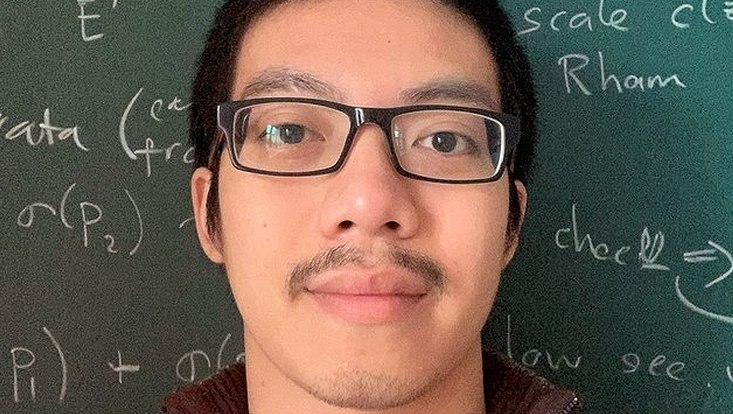Đinh Quý Dương
14 April 2021

Photo: Đinh Quý Dương
Đinh Quý Dương is from Hanoi, the capital city of Vietnam. He completed his Master’s degree in 2019 at Universität Hamburg under the supervision of Prof. Jörg Teschner. His thesis was "On the role of the global nilpotent cones in Conformal Field Theory and the geometric Langlands correspondence". For the cases of spheres with five and six punctures, he obtained an explicit description of the distinguished loci on the moduli of bundles associated to the nilpotent Higgs bundles. These loci are related to the singularities of the conformal block solutions to the Knizhnik-Zamolodchikov equation in Conformal Field Theory (CFT) on the one hand, and of D-modules in the geometric Langlands correspondence on the other.
What is the topic of your research?
With my supervisor Prof. Jörg Teschner, I work on mathematics and physics revolving around the geometric Langlands correspondence. A project we are doing with Troy Figiel – a former student of Jörg Teschner – was initiated as the first, yet sort of unavoidable step to understand the relations between two prominent approaches: One inspired by Conformal Field Theory and one based on Gauge Theory, to geometric Langlands. In this step, we mostly play with some algebraic geometry often featured in the study of classical integrable systems. From here we see more immediate branches ahead: Working out an analytic version of geometric Langlands sketched out by Jörg Teschner, understanding some old formulation of geometric Langlands, or heading towards some CFT machineries.
What fascinates you about your research focus?
My research focus involves a diverse batch of ingredients on the interface of mathematics and physics, and these ingredients, each being interesting on its own, are somehow profoundly related and give hints on a more unifying understanding. The projects which Jörg Teschner suggested me to work on precisely attempt to understand some of these relations better. In practice, I enjoy the freedom to be simple and informal in physics and to create and define in mathematics. I also appreciate the switches of perspectives that my interaction with mathematicians and physicists bring up.
What do you like about the cluster Quantum Universe?
I like the Quantum Universe Days because it is rare to witness many senior scientists engaging in discussions and debates. Through events like these, I hope to see how senior scientists cluster up potentially related projects. Also, thanks to Quantum Universe, I was able to attend German courses at DESY.
What do you like to do in your free-time?
Hamburg’s weather gets much kinder these days and I thank her by taking lots of walks!
